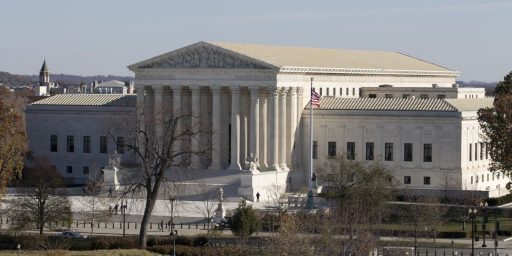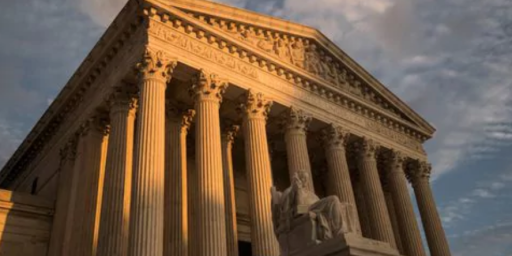Public Employee Unions Dodge A Bullet Thanks To 4-4 Supreme Court Tie
Thanks to an equally divided Supreme Court, public employee unions won a case they most likely would have lost had Justice Scalia lived.
When the Supreme Court heard oral argument in Friedrichs v. California Teachers Association back in January, it seemed as though public employee unions were on the verge of suffering a significant defeat. Even before the case was argued, it had become apparent from previous cases that there were at least four votes among the Court’s conservatives prepared to rule that public employee unions could still charge dues to public employees even when they chose not to join the union and even when at least some portion of those dues were used for political contributions rather than simply to finance collective bargaining and union organizing expenses. Justice Kennedy, who had not seemed willing to go that far in previous cases related to this issue, was clearly skeptical of the practice during his questioning of attorneys for the unions, and Justice Scalia, who had previously indicated in writings that he might be sympathetic to the idea that unions should still be able to collect dues from non-members who benefit from their collective bargaining, was similarly hostile to the union’s position. With the death of Justice Scalia, though, what would have most likely been a 5 -4 decision against the union that would have set a significant national precedent became a 4-4 tie that upholds the decision below, has not applicability outside the 9th Circuit, and would seemingly represent the end of the best chance conservatives had of striking a major blow against public employee unions:
WASHINGTON — A case that seemed poised to deal a major blow to public unions ended in a 4-4 tie on Tuesday at the Supreme Court, effectively delivering a big victory to the unions.
When the case was argued in January, the court’s conservative majority seemed ready to say that forcing public workers to support unions they had declined to join violates the First Amendment.
But the death of Justice Antonin Scalia in February changed the balance of power in the case, which was brought by California public schoolteachers who chose not to join unions and objected to paying for the unions’ collective bargaining activities on their behalf.
A ruling in the teachers’ favor would have affected millions of government workers and weakened public-sector unions, which stood to lose fees from both workers who objected to the positions the unions take and those who simply chose not to join while benefiting from the unions’ efforts on their behalf.
Under California law, public employees who choose not to join unions must pay a “fair share service fee,” also known as an “agency fee,” typically equivalent to members’ dues. The fees, the law says, are meant to pay for collective bargaining activities, including “the cost of lobbying activities.” More than 20 states have similar laws.
Government workers who are not members of unions have long been able to obtain refunds for the political activities of unions like campaign spending. The case, Friedrichs v. California Teachers Association, No. 14-915, asked whether such workers must continue to pay for any union activities, including negotiating for better wages and benefits. A majority of the justices seemed inclined to say no.
As is the custom when the Court is equally divided, there is no opinion of the Court issue, and no dissents are filed. Instead, the Court’s ruling consists of one sentence reading that “the judgment is affirmed by an equally divided court.” Lyle Denniston discusses what this might mean for the future of this issue in the nation’s Courts:
The Court had heard the Friedrichs case on January 11 and, from all appearances then, it seemed to be on its way toward a five-to-four decision to declare that it would be unconstitutional for unions representing government employees to charge fees to workers they represent but who are not among its members, even when the fees cover the costs of normal union bargaining over working conditions, not lobbying or outright political advocacy.
But the death of Justice Antonin Scalia last month left the Court to either find a way still to decide the case, or to end it with an even split. If it had actually tried since Scalia’s death to find a way around a split, that effort clearly came up short. The result set no precedent, and thus left the constitutional issue dangling.
Shortly after Justice Scalia died, the Center for Individual Rights, a conservative legal advocacy group involved in the Friedrichs case, announced that it would ask the Justices to schedule a rehearing on the case if it were to split four to four. The Center said at the time that it expected such a request would put the case off until the Court’s new Term, which is slated to begin on October 3. (UPDATE: Lawyers involved said Tuesday that a rehearing petition will, in fact, be filed.)
Under the Court’s rules, a rehearing request in the Friedrichs case would have to be filed within twenty-five days following Tuesday’s ruling. It would require the votes of five Justices to order such a reconsideration, and one of the five must have been one who had joined in the decision. It is unclear how that rule would work when the judgment had been reached by an evenly divided Court.
Rehearings are governed by Rule 44 of the Rules of the Supreme Court of the United States, and while the rule itself does not limit the grounds on which rehearings can be granted, it’s also generally the case that such rehearings are rarely granted and are wholly within the discretion of the Court. As noted, though, one requirement is that the petition must be approved by a majority of Justices, at least one of whom was part of the opinion of the Court. Since this was a tie decision, it’s unclear what that means, although presumably one could argue that the “winning” side in this case consisted of the four Justices who voted to uphold the fees since that is the practical effect of that decision. That would mean at least one member of the liberal branch of the Court would have to support rehearing in the case. While it’s possible that will happen, it’s worth noting that rehearings are seldom granted by the Justices, and that the fact that we don’t even know at this point when there will be a new Justice would seem to make it unlikely that the Justices will grant a rehearing under such circumstances.
This outcome isn’t really much of a surprise, of course. As I noted when Justice Scalia died, this was one among a number of cases that the Court had heard prior to his death where it was apparent that Scalia’s vote, which was nullified by his death, would change a 5 -4 decision into a 4-4 tie. As I noted at the time, the Court did have the option of ordering a rehearing on its own and scheduling the matter for some time during the next term, but given the fact that we can’t say with any certainty when a new Justice will be able to take the bench it’s not surprising that they didn’t take that step.
As it stands, this decision likely marks the high point of conservative legal challenges to public employee unions for the time being. Any future case similar to this one is likely to face a similar fate until there is a new Justice on the bench. Moreover, unless Justice Scalia’s replacement ends up being chosen by a Republican, or a Republican President somehow ends up choosing replacements for Justice Ruth Bader Ginsburg and/or Justice Stephen Breyer, it is unlikely that the Supreme Court will have a political make up that will be as sympathetic to the arguments of the Plaintiffs in this case as the Court that existed prior to Justice Scalia’s death.






Doug, are there any clues as to how a Justice Garland might have ruled on this case?
@al-Ameda:
He’s pretty much the definition of a centrist. That having been said, the one hallmark of his jurisprudence has been deference to agency interpretations of statutory mandate, especially those of the NLRB. This particular case doesn’t fall into that category, but if I had to guess, I suspect that he’d have voted to affirm the 9th Circuit’s ruling.
Of course Scalia spent his entire career looking backward.
As Toobin put it:
Scalia did what he could to make us less free, less fair, and less tolerant.
May he rest in peace…the Republic is better off without him.
Also in SCOTUS news today…
http://talkingpointsmemo.com/dc/scotus-zubik-order-more-briefs
Fascinating.
Might it be the high point of conservative legal challenges -period- for the time being?
@C. Clavin: That’s freaking hilarious. The Sisters aren’t willing to sign a paper attesting that they have nothing to do with contraception. Now the Court is telling the Sisters (OK, their lawyers) they themselves are responsible for proposing acceptable methods for providing contraceptive coverage to their employees. I don’t know if this came from one of the female Justices, or was maybe inspired by God. Whichever it was, she’s got a wicked sense of humor.
@gVOR08: It’s the SCOTUS trolling the plaintiff. Ha!
Boy, those Republicans sure are teaching us a lesson.
Please, Chuck Grassley! Please Mitch McConnell! Please oh please don’t throw the Supreme Court into the briar patch!!!
When you are up to your ass in alligators, it’s hard to remember why you started draining the swamp!
The primary purpose of public sector unions is to bribe the negotiators on the other side into promoting the union’s interests. Those negotiators — elected officials — are charged with representing their bosses (the electorate) and protecting their interests (their money), but instead are bought by the unions with confiscated money from the public employees.
And what do we get with this situation? Way too many cases like that of Sridhar Boini, a Social Security official who was fired for showing up for work drunk (He also sexually assaulted another government employee while apparently drunk.). He fought his dismissal, arguing that 1) plenty of other employees showed up for work drunk and were not fired, and 2) his drinking was a “disability” and the government should “accomodoate” his drunkenness. That means he should keep getting paid while he undergoes treatment for his drinking, and he should be allowed to telecommute to protect other workers from his predations.
And his union is supporting him.
The government is facing scads of lawsuits over his conduct, from employees who claim he sexually assaulted him to people whose cases he reviewed while drunk, and his union is supporting him.
Yay, unions. Protecting your right to show up drunk and maul women on the job.
Oh please, for this one story I’m sure there are dozens of other stories of corporations treating their employees like $hit…employees who would have been treated better if only they had been unionized…
@An Interested Party:
“Oh, please,” indeed. Two flaws with your comment.
1) The most outrageous part of the Boini story isn’t what he did, isn’t that he thinks he doesn’t deserve to be fired for it, but that his union is standing by him.
2) Your point about “corporations treating their employees like $hit” is irrelevant here, as we’re talking about public employees.
Try harder. If you can.
And so you use this one person and this one union as a way to trash all public sector unions? Talk about outrageous…
Not really, as we could easily use government agencies and corporations interchangeably…in both cases, employees can be mistreated without being unionized…